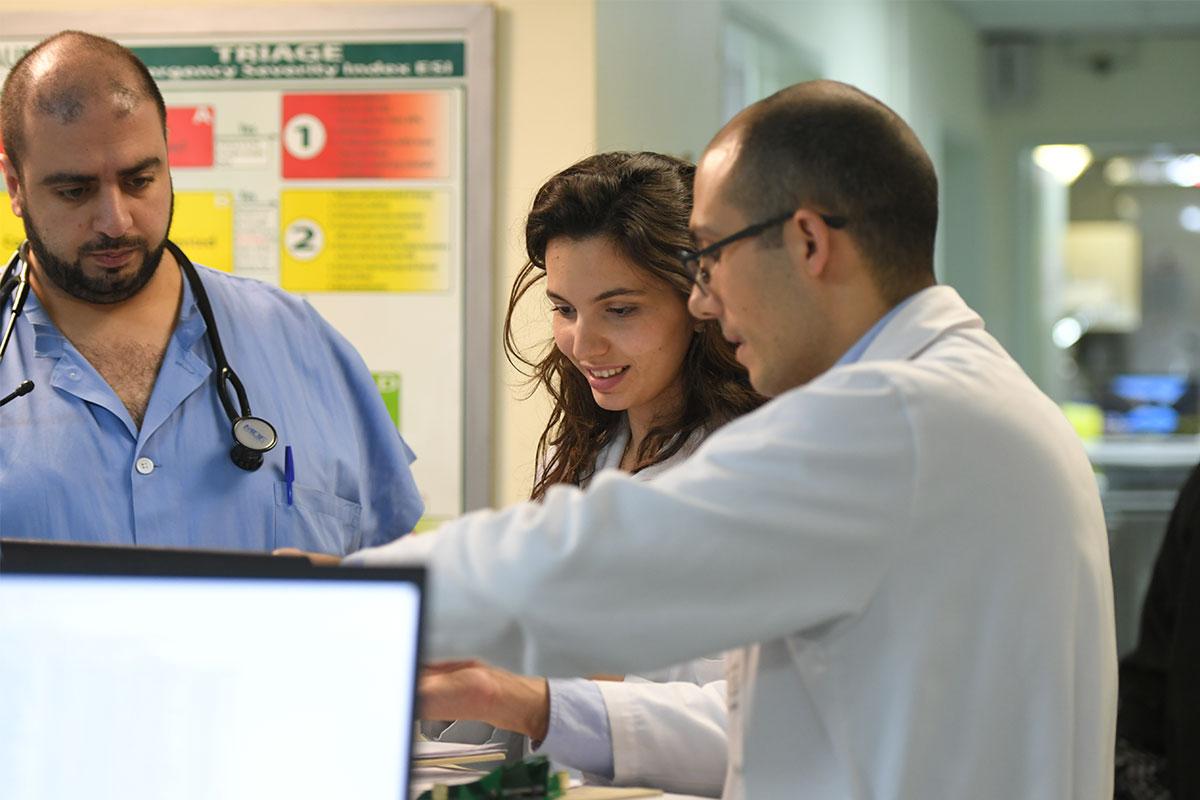LAU Ranked No. 2 in Lebanon in Clinical and Health by THE
The 2021 Times Higher Education Subject Rankings recognizes the excellence of LAU’s health schools and nutrition programs.
LAU has been ranked no. 2 in Lebanon in Clinical & Health education by the 2021 Times Higher Education (THE) Subject Rankings, despite the challenges that the COVID-19 pandemic has wrought on the health sector and medical education.
In this first-ever THE subject ranking for LAU, its performance is attributed to the excellence of its schools of medicine, pharmacy and nursing, and its nutrition programs at the School of Arts and Sciences (SoAS).
Where patient care and safety are at stake, staying abreast of technological advancements and clinical practices in a fast-evolving sector is critical. To that end, the health schools at LAU are invested in a steady research output and continually innovating their curricula, while incorporating practical experience and research to graduate competent health providers. In doing so, they not only uphold student engagement but also multidisciplinary collaborations across schools and programs, as well as with industry.
At the Gilbert and Rose-Marie Chagoury School of Medicine, “students learn in an academic setting guided by frequent communication, shared decision-making, transparency and goal alignment,” says Interim Dean Sola Aoun Bahous. “They are not simply end-users, blind to the product they are offered (the curriculum), but essential agents in implemented improvements.”
To date, LAU’s school of medicine remains the only one in Lebanon to offer a digital literacy course. Similarly, the School of Pharmacy (SOP), within the past few years, has launched the Postgraduate Year One (PGY1) Pharmacy Residency – a program that provides residents with advanced, hands-on experience in clinical practice, education and research – and a Master of Science in Pharmaceutical Development and Management.
The SOP also boasts the only Doctor of Pharmacy program outside the US to be accredited by the Accreditation Council for Pharmacy Education (ACPE).
“The SOP’s mission and strategic directives revolve around the triad of education, practice and research,” says Dean Imad Btaiche, where “education, especially in the clinical sciences, has its own distinctive features. The recently established MS graduate program and postgraduate residency will prove instrumental in pushing forward the three elements of the triad.”
The same applies to the Alice Ramez Chagoury School of Nursing, which is accredited by the Commission on Collegiate Nursing Education (CCNE). “With the talented faculty and staff,” says Interim Dean Costantine Daher, “our program provides students with essential skills and hands-on training that is required to become competitive nurses in the field of healthcare.”
Pre-clinical and clinical excellence at the schools is underpinned by affiliations with various international and local institutions and hospitals, and “the adoption of innovative teaching tools, such as using virtual patients in education and interactive platforms, among others,” says Dr. Aoun Bahous.
The added benefit of the LAU Medical Center-Rizk Hospital, says Dr. Btaiche, has earned the SOP’s clinical enterprise increasing recognition “in the clinical education and research fields.”
A differentiator for clinical and health education at LAU has been Interprofessional Education (IPE), which enables interdisciplinary collaboration and knowledge-sharing between the different health disciplines and constitutes a mandatory component of LAU’s curricula in medicine, pharmacy, nursing and nutrition.
In September 2020, the Accreditation Council for Education in Nutrition and Dietetics (ACEND) selected the BS in Nutrition and Dietetics Coordinated Program (CP) at SoAS as one of the 2020 Noteworthy Practices among ACEND-accredited programs for its IPE. The MS in Nutrition, launched in 2018, is also distinguished in Lebanon by its IPE emphasis.
Collaborations between science and health disciplines (biology, chemistry, psychology, nutrition, nursing, pharmacy, and medicine) have culminated in invaluable research, community outreach activities, and health awareness campaigns that involve both faculty and students, says Associate Professor of Nutrition and CP Coordinator Maya Bassil.
“Nutrition faculty and students,” adds Dr. Bassil, “are actively involved in nutrition and food research, whereby their work and publications have significantly contributed to the advancement of nutritional and food sciences in Lebanon, the region and the world.” As a result, nutrition faculty have attracted grants from UNICEF, the World Food Programme and the National Institutes of Health for community interventions and assessment projects.
Among THE’s main weightings for Clinical and Health rankings are teaching or the learning environment, research in terms of volume, income and reputation for excellence among institutional peers, and citations, which reflect the reach and influence of the university’s research – benchmarks that are aligned with the pillars of LAU’s Third Strategic Plan.
Other THE indicators are the university’s reputation for research excellence among its peers and the extent to which its research has contributed to general knowledge and has been shared around the global scholarly community.
To qualify for the Clinical and Health ranking, a university must satisfy a publication threshold of 500 papers over five years as well as an academic staff threshold of 50 full-time faculty members by discipline.
“LAU’s impressive ranking,” says LAU President Michel E. Mawad, “speaks of the hard work and diligence of faculty and staff at our relatively young schools of medicine, pharmacy, nursing and our nutrition programs that have paved the way to academic recognition.”
